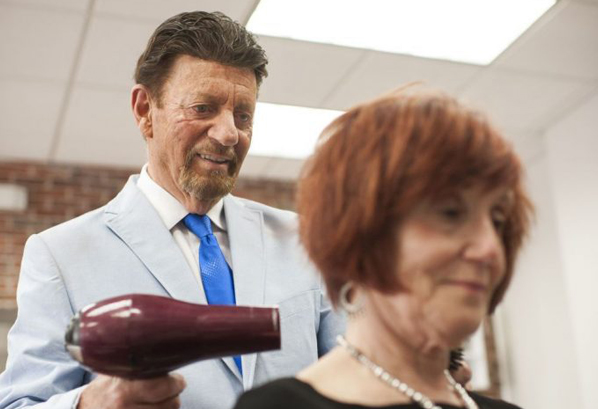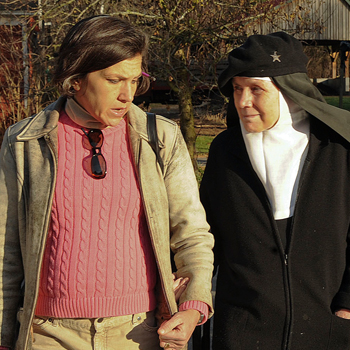By Bailey Knecht, Bulletin Correspondent
‘I want to get it perfect. You want to perfectly portray this person who has spent time with you, to give the most authentic record of what this person is like, and that’s always the most difficult challenge. It’s a frightening challenge, really.’
— Tracey O’Shaughnessy, Associate features editor
Republican-American, Waterbury, Conn.

 Capturing the essence of a person through writing isn’t a simple task.
Capturing the essence of a person through writing isn’t a simple task.
Sometimes, journalists just have to become part of the story themselves. That’s why, when Tracey O’Shaughnessy began working on a feature on Robert Accetura, a beloved hairstylist in Waterbury, Conn., she decided to take a seat in the styling chair and have Accetura work his magic on her hair.
“I watched him, and I listened to him, and then I realized if I really wanted to understand him, I was going to have to get the treatment, and I was going to have to go under the scissors,” O’Shaughnessy said. “He sort of exudes this sense of capability and expertise, and this incredible sense of caring about the people whose hair he cuts, and it was really through the process of listening to him as he worked on me that I could really see him come out.”
The connection O’Shaughnessy formed with Accetura turned into a personality profile that would go on to win first place for that category of story in a daily newspaper, among the New England Newspaper and Press Association awards presented at NENPA’s winter convention in February.

O’Shaughnessy, associate features editor of the Republican-American of Waterbury, is no stranger to that style of writing. She’s been at the Republican-American for 23 years, and before that, she spent time writing for the Potomac Almanac in Bethesda, Md., the Norwich (Conn.) Bulletin, and Gannett News Service in Washington, D.C.
Rich Gray, features editor of the Republican-American, said the award was well-deserved, because of the amount of dedication O’Shaughnessy displays.
“She always impresses with the spirit that she brings to things and the base of knowledge that she starts from,” he said. “She never worries about admitting that she doesn’t understand something. I listen to her talk to sources all the time, and see how the wheels turn. It’s quite a process, and I’ve seen her grow, believe it or not, and she still seems to get better and better with what she does.”
Gray said O’Shaughnessy has built a strong relationship with the Waterbury community, which has helped to increase readership.
“She’s got a base of followers already established, and readers know what to expect from a Tracey O’Shaughnessy byline, which we sorely need these days,” he said.
Even with O’Shaughnessy’s positive reputation in the community and years of experience, writing feature stories can still be difficult for her, she said.
“I want to get it perfect,” she said. “You want to perfectly portray this person who has spent time with you, to give the most authentic record of what this person is like, and that’s always the most difficult challenge. It’s a frightening challenge, really.”
Despite that pressure, she has developed a few techniques that have been effective when dealing with sources.

‘She’s got a base of followers already established, and readers know what to expect from a Tracey O’Shaughnessy byline, which we sorely need these days.’
— Rich Gray, Features editor ~ Republican-American, Waterbury, Conn.
“I often say that the two most important qualities in this business are humility followed by curiosity,” she said. “The two work hand in hand. I go in there completely aware that I know very little, and the one thing I do know is that, in this world, people do not get the respect they deserve, so I’m very, very careful when I’m speaking with people to give them the respect they lack.”
She discussed the necessity of building an immediate relationship with subjects such as Accetura.
“The most important thing in any interview is rapport,” she said. “You have to develop a rapport with the person that you’re speaking (to), and that rapport happens in a matter of seconds, so you have to be very deft and very swift.”
O’Shaughnessy said that, in the writing process, bringing her interview subjects to life is her main goal as a features writer.

‘Feature stories are the heart of humanity, and the heart of humanity is what I’m aiming for. If you don’t have a newspaper that bleeds and cries along with its readers, then you don’t have a going concern. You’re not doing your job.’
— Tracey O’Shaughnessy
“I always remember that we who are journalists only have black-and-white figures — print on paper — to create color and music,” she said. “So you have to use the words and the way the words fit on the page as a kind of color and as a kind of music.”
O’Shaughnessy said she hopes through her profiles to create a space for her readers to feel strong emotions while they’re reading the Republican-American.
“Feature stories are the heart of humanity, and the heart of humanity is what I’m aiming for,” she said. “If you don’t have a newspaper that bleeds and cries along with its readers, then you don’t have a going concern. You’re not doing your job.”
